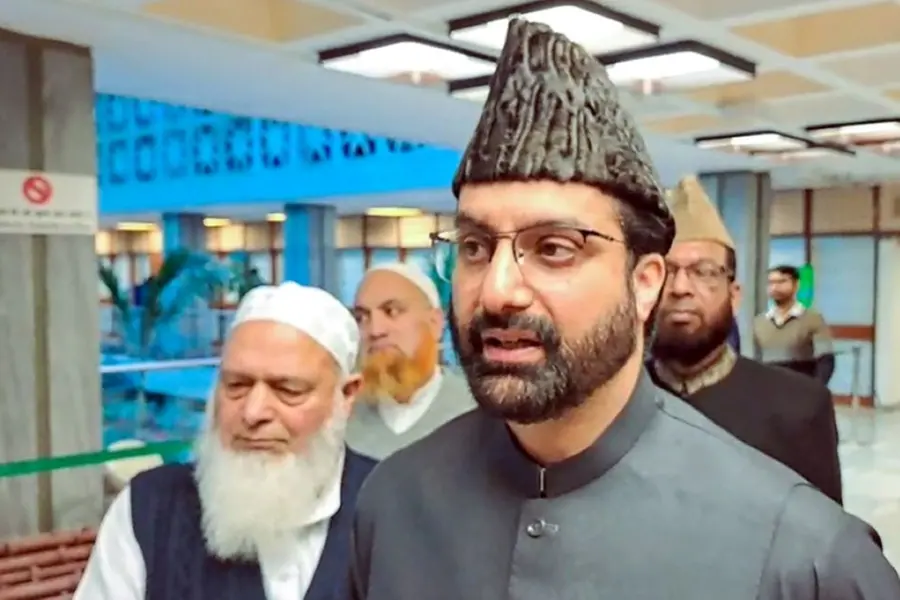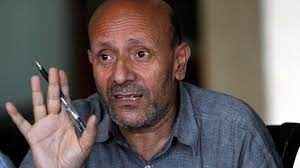Kashmiri leaders unite in grief and appeal for peace as the Red Fort car blast claims multiple lives; jailed MP’s symbolic protest draws national attention.
By: Javid Amin | 11 November 2025
In a rare moment of moral and political convergence, Mirwaiz Umar Farooq, the spiritual head of Kashmir’s Mutahida Majlis-e-Ulema, and Engineer Rashid, jailed Member of Parliament from Baramulla, have both spoken out against violence following the Red Fort car blast in New Delhi that left at least eight people dead.
Mirwaiz Umar Farooq’s Call for Calm and Compassion
Condemning the November 11 blast, Mirwaiz Umar Farooq expressed deep anguish and solidarity with the victims’ families.
In a message posted on X (formerly Twitter), the Mirwaiz of Kashmir wrote that “such acts of violence bring nothing but misery and destruction.” He urged all communities to uphold peace and humanity, stating:
“Our prayers are with the bereaved families and those injured. Violence has never served a cause — it only deepens wounds.”
He also appealed to youth, religious groups, and policymakers to “strengthen compassion over conflict”, calling the incident a reminder of the fragility of peace and the urgency of unity.
Engineer Rashid’s Symbolic Hunger Strike from Tihar Jail
Meanwhile, Engineer Rashid, founder of the Awami Ittehad Party (AIP) and sitting MP from Baramulla, has announced a two-day hunger strike starting November 12 inside Tihar Jail.
Rashid, who has been imprisoned for over five years under NIA money-laundering charges, wrote a formal letter to the Director General of Prisons, expressing grief over the Delhi blast and concern over reports suggesting possible Kashmiri involvement.
According to sources close to his family, the hunger strike is meant as both a mourning gesture and a moral appeal to Kashmiri youth to renounce violence.
“We must reject this cycle of destruction. The path of peace and dialogue is the only way to preserve dignity,” Rashid reportedly stated in his letter.
The Dual Message: Faith and Politics for Peace
The simultaneous response from two of Kashmir’s most prominent voices — one religious, the other political — highlights a growing introspection within the Valley.
Both leaders, despite their vastly different positions, have emphasized the same message: violence is not a solution.
Analysts view these statements as an important shift in public discourse — where moral authority meets political accountability, offering a unified message of peace amid turbulence.
“When figures like Mirwaiz and Rashid speak in one voice against bloodshed, it resonates deeply,” said a Srinagar-based political observer. “It’s a sign that moral conscience still cuts across ideological divides.”
Background: From Budgam to Delhi – The Shockwave of Violence
The Red Fort car explosion occurred near Gate No. 1 of the Metro Station, killing at least eight people and setting several vehicles ablaze.
The blast came on the same day that J&K Police, along with national agencies, busted a major terror module linked to Jaish-e-Mohammed and Ansar Ghazwat-ul-Hind, seizing over 360 kg of explosives and arresting several individuals, including three doctors, in Faridabad.
Authorities have heightened security across major cities amid fears of interlinked terror operations.
Broader Implications: A New Moral Moment for Kashmir?
The condemnations and protests mark a potential moral recalibration in Kashmir’s political landscape.
-
Religious leadership is reaffirming the value of compassion and restraint.
-
Political figures like Rashid are redefining resistance within non-violent frameworks, even from behind bars.
-
Civil society is urging youth to distance themselves from militancy narratives that have cost countless lives.
This convergence of spiritual and political calls for peace could help reshape the conversation around Kashmir’s future — from victimhood and vengeance to accountability and healing.
Conclusion
As the investigation into the Delhi blast continues, the responses from Mirwaiz Umar Farooq and Engineer Rashid underline a crucial truth: Kashmir’s path forward depends not on retaliation, but reflection.
Their voices — one from the pulpit and one from a prison cell — may represent the beginnings of a new moral consensus in a region long scarred by violence.



